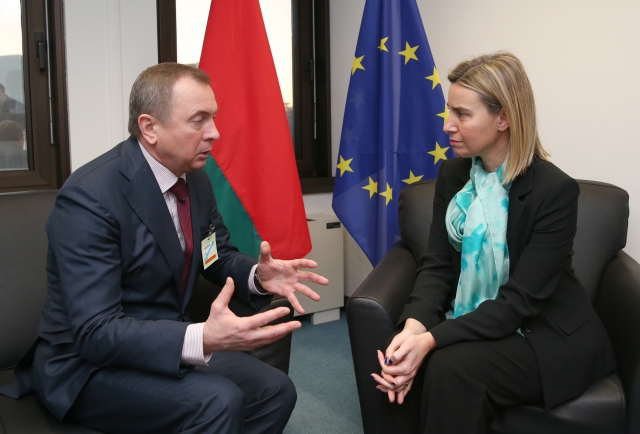
The European Union Lifts Its Sanctions Against Belarus
Publication: Eurasia Daily Monitor Volume: 13 Issue: 33
By:

Just days before the European Union Foreign Affairs Council’s resolution to lift the sanctions imposed on Belarus in the aftermath of the December 2010 presidential elections, the Belarusian media were full of musings and speculations about the upcoming decision. Some, like veteran opposition journalist Alexander Klaskovsky, opined that the sanctions would be re-imposed and suspended but not entirely removed (Naviny.by, February 10). Most observers, however, expressed the view that sanctions would be lifted altogether, except on three former and one current Belarusian official suspected of having played a key role in the disappearance of four politically active Belarusians in 1999–2000; also the ban on Belarusian exports of ammunition could be retained.
After Belarusian Foreign Minister Vladimir Makei expressed his cautious optimism about the upcoming removal of the sanctions (Tut.by, February 8), at least one opposition-minded commentator, Denis Melyantsov, argued that Makei’s assessment was too cautious. After all, Belarus, Melyantsov asserted, is already conducting negotiations with several European agencies as if sanctions were already gone, and the Ukrainian crisis played a decisive role in the EU’s stand on Belarus (Tut.by, February 10). Three days after Makei’s statement, Belarus’s representative at the EU and the North Atlantic Treaty Organization (NATO) as well as ambassador to Belgium and Luxembourg, Andrei Evdochenko, expressed more clearly worded optimism: “Both in Minsk and in Brussels, there is confidence that common sense would gain the upper hand and we will begin establishing the broader fabric of our relationships.” He added, “I am convinced that it is geopolitics that stands behind all the decisions of our European partners, other centers of power, and third countries—whatever slogans obscure this truth” (Tut.by, February 11).
At about the same time, an unnamed Eurocrat told a correspondent of Tut.by, Belarus’s most popular non-state-run news portal, what to expect after sanctions are removed. For one thing, Belarus will gain access to the European borrowing market by way of Eurobonds. These are debt investments whereby an investor loans a certain amount of money, for a certain amount of time, with a certain interest rate, to the entire Eurozone bloc, which then forwards the money to individual governments. The role of the primary investor will be played by the European Investment Bank (EIB), something that was out of the question when sanctions were in place. At the same time, the European Bank for Reconstruction and Development (EBRD), which is already doing business with Belarus’s private companies, will be allowed to finance the projects of state-owned entities. Also, the EU will support Belarus’s accession to the World Trade Organization (Tut.by, February 12).
In an extensive interview to Tut.by, Andrejs Mamikins, a Latvian member of the European Parliament and also a member of its “delegation for relations with Belarus,” expressed the view that while concerns over human rights in Belarus are not entirely trumped up, the prisoners that were released in August hardly deserved to be called “political.” He also noticed that when Latvian Foreign Minister Edgars Rinkēvičs visited Minsk (see EDM, April 19, 2013), he glossed over Belarus’s deviations from democracy. Specifically, he spent 40 seconds on this issue, following which he proceeded to talk about areas of mutual cooperation for the next 20 minutes (Tut.by, February 11).
In this regard, it is highly symptomatic that in the supposedly democracy-and-freedom-loving Ukraine, it is Alyaksandr Lukashenka whom representative surveys repeatedly named the most popular national leader from a foreign country. Thus, in December, the Ukrainian polling firm Rating revealed that Lukashenka is admired by 63 percent of Ukrainians (top of the list), Angela Merkel by 58 percent, Barack Obama by 37 percent, and Vladimir Putin (bottom of the list) by just 10 percent. According to Yury Drakakhrust, of Radio Liberty, this result reflects the actual attitudes of Ukrainian society with more precision than the much poeticized image of the Maidan, i.e. the locus of February 2014 “revolutionary” events in Kyiv. Ukrainians hate oligarchs and crave order, and that is what Lukashenka embodies in their eyes, Drakakhrust argued. “To aspire to be Europe and to actually be Europe are two slightly different things,” he remarked. Lukashenka’s stance in regard to Ukraine’s territorial integrity also matters (Svaboda.org, February 11). Incidentally, in the Russian-language segment of the Internet (which effectively means in Russia, Belarus and Ukraine), the most positively acclaimed joke about Lukashenka is the following one: “When Lukashenka was asked how many years he would need to put Ukraine in order, he replied: Years? Just three days! On the first day, I’ll shoot all the Rada deputies; two days later, I’ll shoot all those who came to their funeral” (see for example, Proza.ru, April 14, 2014).
In a separate Radio Liberty publication, Drakakhrust reflects on Russia’s putative attitude toward Belarus’s improvement of relations with the West. The reality is that even after the lifting of sanctions, Lukashenka will, at best, equal Nazarbayev, the president of Kazakhstan who is every bit as authoritarian as Lukashenka; and yet, Nazarbayev enjoys normal relations with the West. So will Russia allow Lukashenka to transform into a second Nazarbayev? A response to that question will appear soon, claims Drakakhrust. If, following the removal of sanctions, Russia’s pressure on Belarus grows exponentially and news of new “trade wars” again comes to the fore, it will mean that even a normalization of Minsk’s relationship with the West crosses a red line for Moscow. If, however, this is not the case and even the long-promised Russian loan for Belarus is delivered, this will mean that the said normalization is perhaps not desired by Moscow but is not treated as a critical infraction (Svaboda.org, February 10).
On February 15, the EU did indeed lift most sanctions on Belarus (Tut.by, February 15). According to the EU’s foreign policy head, Federica Mogherini: “no geopolitics whatsoever [has been involved in the EU’s decision]; our decisions are always merit-based” (Tut.by, February 15). In saying this, Mogherini is certainly not breaking any records for diplomatic doublespeak. But more importantly, a door has been opened for Belarus to perhaps finally escape its economic woes and political isolation.




